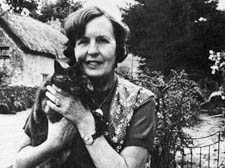|
|
 |
| |

Barbara Pym |
Camden Book Reviews | Excellent Women | Barbara Pym | Virago Modern Classic | Jane Austen | English literature
Tale of sexual frustration told with Austen-like precision
I SUPPOSE an unmarried woman just over 30, who lives alone and has no apparent ties, must expect to find herself involved or interested in other people’s business, and if she is also a clergyman’s daughter then one might really say that there is no hope for her.”
In this one sentence near the beginning of her second novel, first published in 1952, Barbara Pym, with the precision of Jane Austen, sums up Mildred Lathbury’s unloved plight as a spinster.
Pym repeats it again and again like a mantra throughout these 288 pages of intense sexual frustration. Margaret Drabble describes this as “celibate flirtation” in her last edition of The Oxford Companion to English Literature.
Mildred is besieged by her timidity, chronic lack of self-esteem and even greater lack of experience grounded in reality. She is emotionally constricted, working for an organisation for “distressed gentlewomen” – such organisations really did exist in the repressive 1950s.
All she felt she was ever fit to do was make endless cups of tea, hand out cake and be at the beck of the nearby High Church vicar Father Julian Malory, and his sister Winifred.
The wonder is that she ever put a foot right.
Mildred’s life shifts when Helena Napier and, soon after, her sickly-sweet naval husband Rockingham move into the house where she lives. The slender plot, such as it is, is thereby kickstarted into motion on page one.
Pym’s near-orgiastic set-pieces include a chaotic jumble sale and a disembodied lecture at The Learned Society, an institute for anthropologists. The latter may not be entirely based in fantasy. Pym did once work in the International African Institute in London. Clearly she collects institutions in the way small boys collect marbles.
By the end, I became weary of Mildred’s never-ending fantasies of what life would be like in the unlikely event of her love ever being
reciprocated by a man.
No wonder the unhugged poet Philip Larkin, who with Lord David Cecil named Pym “the most underrated writer of the century” in a famous piece in Times Literary Supplement in 1977, took refuge in pornography. The 10 novels she bequeathed posterity were too full of the pain and suffering of intense sexual frustration for his comfort.
Excellent Women is a classic comfort read. As Alexander McCall Smith, the latest master of this genre reminds us in his introduction: “A Barbara Pym moment occurs when one realises that for those one is observing, one will never be an object of love. Tolerant affection, perhaps, but never deep, passionate love. One is not really entitled to expect such an emotion, although it is ennobling, some say, to observe it in others.”
But there is a ray of hope for Mildred on the last page.
You will have to read Excellent Women right through to the end to find it for yourself.
John Horder |
 |
|
 |
 |
|
 |
|


